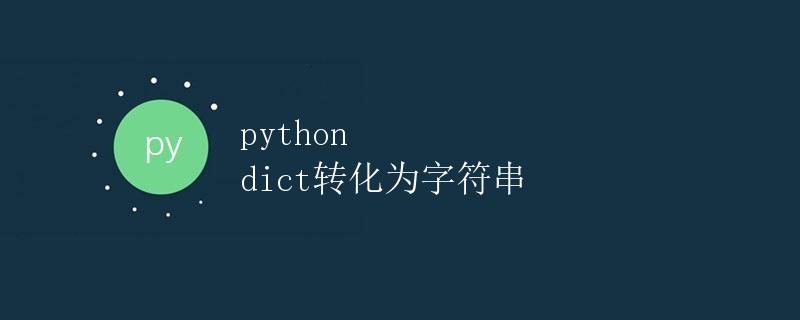Python dictionary to string conversion
Converting a Python Dictionary to a String

In Python, dictionaries are a very common and powerful data structure. They store data as key-value pairs, making it easy to store and manipulate data. Sometimes we need to convert dictionaries to strings for output or passing them to other functions. This article will detail how to convert Python dictionaries to strings.
Method 1: Using the json.dumps() Method
The json.dumps() method is included in the Python standard library for processing JSON data. We can use it to convert a dictionary to a string. The following is a simple example code:
<pre><code class="language-python line-numbers">import json
# Define a dictionary
dict_sample = {'name': 'Alice', 'age': 20, 'gender': 'female'}
# Convert the dictionary to a string
str_sample = json.dumps(dict_sample)
print(str_sample)
Running the above code produces the following output:
{"name": "Alice", "age": 20, "gender": "female"}
In this example, dict_sample is the dictionary we want to convert. We use the json.dumps() method to convert it to a string and assign it to the str_sample variable. The final output is the dictionary converted to a JSON-formatted string.
Method 2: Using the str() Method
The Python str() method converts an object into a string. We can use this method to convert a dictionary into a string. The sample code is as follows:
# Define a dictionary
dict_sample = {‘name’: ‘Bob’, ‘age’: 25, ‘gender’: ‘male’}
# Convert the dictionary to a string
str_sample = str(dict_sample)
print(str_sample)
Running the above code produces the following output:
{'name': 'Bob', 'age': 25, 'gender': 'male'} <p>In this example, we directly use the str() method to convert the dictionary dict_sample to a string and output it. This method is simple and quick and suitable for simple dictionary-to-string conversions. </p> <h2>Method 3: Using the join() Method</h2> <p>If we want to concatenate the key-value pairs in a dictionary into a string, we can use the <code>join()method. The sample code is as follows: # Define a dictionary dict_sample = {'name': 'Cathy', 'age': 30, 'gender': 'female'} # Concatenate dictionary key-value pairs into a string str_sample = ', '.join([f'{key}: {value}' for key, value in dict_sample.items()]) print(str_sample)Running the above code produces the following output:
name: Cathy, age: 30, gender: femaleIn this example, we use list comprehensions and the
join()method to concatenate key-value pairs in a dictionary into a single string. This method provides flexible control over how key-value pairs are joined, adapting to specific formatting requirements.Summary
This article introduced three common methods for converting Python dictionaries to strings: using the
json.dumps()method, thestr()method, and thejoin()method. Each method has its own applicable scenarios, and you can choose the appropriate method for the conversion based on your specific needs.